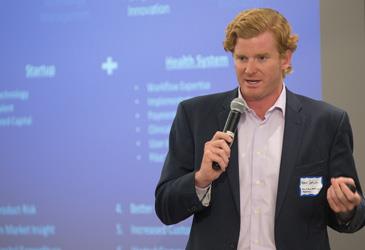 Innovation drives the advancement of health IT, but high-tech developments won’t benefit health care if they’re not created in collaboration with physicians who actually have to use these new technologies. That’s why Henry Ford Health System has devised a way for physicians to take their nascent digital ideas and shape them into bold new technologies to help improve health care delivery and reduce costs. Check out these three programs that are propelling physicians to take the lead in health IT.
Innovation drives the advancement of health IT, but high-tech developments won’t benefit health care if they’re not created in collaboration with physicians who actually have to use these new technologies. That’s why Henry Ford Health System has devised a way for physicians to take their nascent digital ideas and shape them into bold new technologies to help improve health care delivery and reduce costs. Check out these three programs that are propelling physicians to take the lead in health IT.
“I think innovation technology is a great way to combat burnout among physicians,” said Ward Detwiler, associate director of innovations at Henry Ford Health System. “It gives people a new outlet for their creativity and [helps physicians] redesign what their job is.” Detwiler noted that this is especially true for residents who often greet him at events with exciting health solutions and entrepreneurial ideas.
Detwiler was among several keynote speakers at a special AMA-sponsored health innovation event hosted Thursday at health technology incubator MATTER. The event brought together physicians, entrepreneurs, health system executives and health IT specialists to discuss future solutions for health care technology.
How Henry Ford empowers physicians to advance health IT
“We take on a lot of projects that may not have commercial implications,” Detwiler said. But if they’re implemented within Henry Ford’s own system and can help lower health care delivery costs, Detwiler said they’re willing to innovate around them.
“We really try to look at hospitals differently. Hospitals are no longer just ‘factories’ for making sick people well. They’re hugely more important than that,” he said.
“Hospitals are often the largest employers. They’re the bigger aggregators of capital talent … hospitals are these collections of amazing assets—of opportunities, technology, capital, talent,” Detwiler said. “These are the building blocks of innovation, new technologies and ideas, so the goal of an effective innovations group is to figure out, ‘How can we unlock these assets, organize them and put them to use to create new solutions?’”
Despite the promise of new technologies, when prompted to innovate, physicians face a “huge cultural problem” in medicine that prohibits them from trying new things, Detwiler said.
“Whether it’s fear of failure or not being incentivized to experiment—these are the things I think hold [physicians and care teams] back from bringing new ideas,” he explained.
To avoid this, Henry Ford created special programming for physicians to test their ideas and connect with resources to turn them into practical health care solutions. Three such programs are:
- The Henry Ford Innovation Institute, which is designed to focus on research education, commercialization opportunities and training to enhance patient care through innovations and creative ideation. The institute serves as a physical and virtual resource for physicians with special access to technological opportunity assessments, engineering services for prototypes, seminars designed to develop health care technologies and medical products, and several other innovative opportunities. “The idea for this came from two physicians who said they needed a separate space to come where they felt safe to fail [and] collaborate,” Detwiler said. Take a virtual tour of the space to learn more about the institute.
- Davidson Fellowship for Entrepreneurs in Digital Health, which allows 30 people from Henry Ford and Detroit-area organizations and technology companies to enter “entrepreneurship 101.” Participants learn the fundamentals of entrepreneurial leadership, so they can create sustainable health care innovations and businesses.
- The Henry Ford Innovation Institute FAB LAB, which is a unique and valuable resource for physicians to launch new products. Located centrally on Henry Ford’s Detroit campus, the FAB LAB allows clinicians and staff to work in an integrated way with Henry Ford’s team of innovation professionals to realize the benefits of early-stage product design and planning. Physicians have access to special resources such as 3D printing, cutting-edge design and visual software. They’re also given an array of experts to consults in product innovation, technology transfer, intellectual property and commercialization.
“One of the most critical things [Henry Ford has] done is create low-risk opportunities and experiences for our employees that make them think, ‘Maybe this can be part of my job. Maybe this isn’t so scary. I’m not going to get yelled at by the chief of surgery when my new technology or startup idea fails, and maybe I’m going to try it again,’” Detwiler said.
Learn more about physician innovation
- Read what med ed experts are saying about health technology.
- Check out these three must-have tips from physician entrepreneurs.
- Learn what happens when “Shark Tank” and health technology meet.




